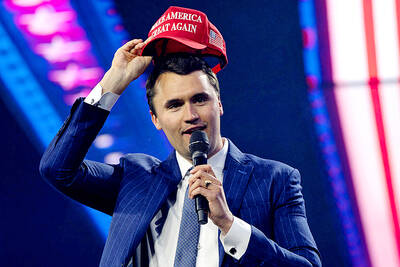Australian Prime Minister Kevin Rudd departed yesterday on his first big overseas trip, armed with plans to make his country more active in global affairs and bearing bad news for US President George W. Bush on Iraq.
Before departing, Rudd, elected four months ago as Australia's first new leader in more than a decade, outlined a foreign policy vision that contrasts with his predecessor by offering stronger support for the UN, while hinting at looser ties with Washington.
The first stop in a 17-day trip to Australia's most important strategic and economic partners is Washington, where Rudd will confirm his policy of withdrawing Australia's 550 combat troops from Iraq in a face-to-face meeting with Bush.
Rudd will then hold talks with UN Secretary-General Ban Ki-moon in New York before attending a NATO meeting in Bucharest, Romania, where he is expected to repeat Australia's demands for greater involvement in the security alliance's Afghanistan planning and press for more European troops in the war-torn country.
Other stops include London, Brussels and Beijing, where Rudd, a Mandarin-speaking former diplomat to China, will stress Australia's growing economic ties in Asia and Canberra's commitment to engaging with the region.
In a major speech late on Wednesday, Rudd said his government had spent its first three months in power focusing on domestic issues but was now turning its attention overseas.
He said Australia existed in an "increasingly joined-up world" with which it must become more engaged to meet economic, security and environmental challenges posed to all nations.
"The truth is, Australia's voice has been too quiet for too long across the various councils of the world," Rudd said in the speech. "That is why during the course of the next three years, the world will see an increasingly activist Australian international policy in areas where we believe we can make a difference."
The comment contrasts with the approach of his predecessor, conservative former prime minister John Howard, who was criticized for being too close to Washington, especially on the issue of Australia joining the 2003 invasion of Iraq, and letting Australia's relations with the UN erode.
After his election, Rudd quickly reversed Howard's policies on two controversial areas involving the US -- he signed the Kyoto Protocol on fighting global warming, leaving Washington isolated as a holdout among developed nations and he vowed to bring Australian troops home from Iraq.
Australia has some 1,500 troops in and around Iraq and Rudd has said he will pull out the combat contingent by the middle of this year, leaving the others in support roles. Australia's 1,000 troops in Afghanistan will not be changed.
Rudd said security, climate change and foreign aid would be among the issues for discussion with world leaders during his trip. But Australia's economic interests and the financial fallout from the global credit crunch would be at the top of his agenda.

‘HYANGDO’: A South Korean lawmaker said there was no credible evidence to support rumors that Kim Jong-un has a son with a disability or who is studying abroad South Korea’s spy agency yesterday said that North Korean leader Kim Jong-un’s daughter, Kim Ju-ae, who last week accompanied him on a high-profile visit to Beijing, is understood to be his recognized successor. The teenager drew global attention when she made her first official overseas trip with her father, as he met with Chinese President Xi Jinping (習近平) and Russian President Vladimir Putin. Analysts have long seen her as Kim’s likely successor, although some have suggested she has an older brother who is being secretly groomed as the next leader. The South Korean National Intelligence Service (NIS) “assesses that she [Kim Ju-ae]

In the week before his fatal shooting, right-wing US political activist Charlie Kirk cheered the boom of conservative young men in South Korea and warned about a “globalist menace” in Tokyo on his first speaking tour of Asia. Kirk, 31, who helped amplify US President Donald Trump’s agenda to young voters with often inflammatory rhetoric focused on issues such as gender and immigration, was shot in the neck on Wednesday at a speaking event at a Utah university. In Seoul on Friday last week, he spoke about how he “brought Trump to victory,” while addressing Build Up Korea 2025, a conservative conference

DEADLOCK: Putin has vowed to continue fighting unless Ukraine cedes more land, while talks have been paused with no immediate results expected, the Kremlin said Russia on Friday said that peace talks with Kyiv were on “pause” as Ukrainian President Volodymyr Zelenskiy warned that Russian President Vladimir Putin still wanted to capture the whole of Ukraine. Meanwhile, US President Donald Trump said that he was running out of patience with Putin, and the NATO alliance said it would bolster its eastern front after Russian drones were shot down in Polish airspace this week. The latest blow to faltering diplomacy came as Russia’s army staged major military drills with its key ally Belarus. Despite Trump forcing the warring sides to hold direct talks and hosting Putin in Alaska, there

North Korea has executed people for watching or distributing foreign television shows, including popular South Korean dramas, as part of an intensifying crackdown on personal freedoms, a UN human rights report said on Friday. Surveillance has grown more pervasive since 2014 with the help of new technologies, while punishments have become harsher — including the introduction of the death penalty for offences such as sharing foreign TV dramas, the report said. The curbs make North Korea the most restrictive country in the world, said the 14-page UN report, which was based on interviews with more than 300 witnesses and victims who had